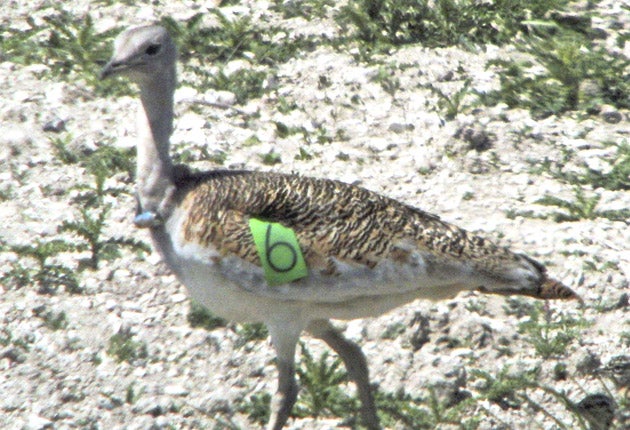Giant bird breeds in Britain for first time in 177 years

The world's heaviest flying bird, the globally-threatened great bustard, has bred successfully in Britain for the first time since 1832.
Five years into a reintroduction programme, which has brought young birds from southern Russia where the species is relatively plentiful, a female produced two chicks last week at a secret site on Salisbury Plain in Wiltshire. Their birth is a conservation success story on a par with the return of the sea eagle to the west coast of Scotland, bringing back to the UK one of Europe's most charismatic and unmistakable creatures. The turkey-sized males can reach nearly 50lb in weight.
Once common on extensive grassland, from south-west England to the Scottish borders, Otis tarda was a bird which was so remarkable, in its mammoth size and bold plumage, that it impressed itself deeply on rural culture.
It still sits on the coats of arms of Wiltshire and Cambridgeshire county councils; there are still two pubs called The Bustard, one in Wiltshire and one in Lincolnshire; there is a beer called Great Bustard, part of the Stonehenge Ales range; the bird is the badge of Wiltshire girl guides; and it is the badge of the Royal School of Artillery on Salisbury Plain.
But it was such a visible and tempting target for hunters and egg-collectors that it was gradually driven to extinction 177 years ago, when the last female with a chick was observed in Suffolk. Now, there are thought to be no more than 32,000 birds in Europe, with two centres of population: one in Spain and Portugal, and the other in Russia.
The Russian chicks brought to Britain have come from the Saratov area on the Volga 800 miles south of Moscow, from eggs in nests which otherwise would have been destroyed by farmers. Organised by the charity the Great Bustard Group, the programme has each autumn released between six and 32 young birds on to Salisbury Plain. Eggs from clutches in 2007 and 2008 were infertile, probably because of the young age of the males.
Last month a female bird was observed incubating a clutch of eggs; a few days ago they hatched, and two chicks were seen following their mother and being fed. David Waters, a former Wiltshire policeman who founded the Great Bustard Group, said: "I am exhausted and nearly broke, but to see great bustards breeding after an absence of 177 years is brilliant."
Join our commenting forum
Join thought-provoking conversations, follow other Independent readers and see their replies
Comments